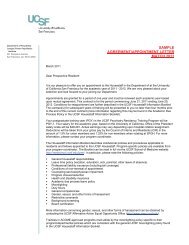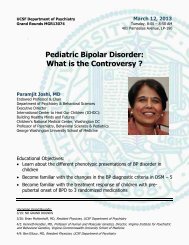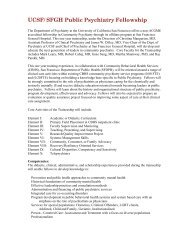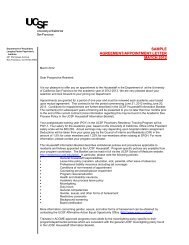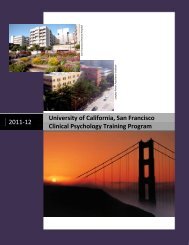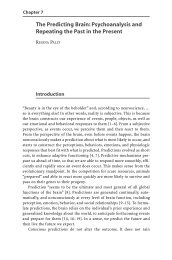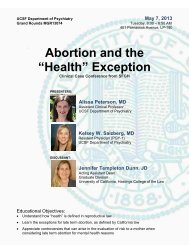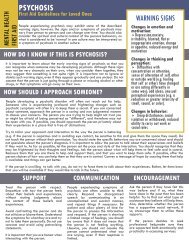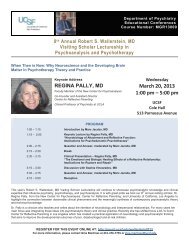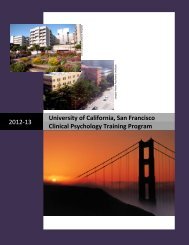Clinical Psychology Training Program - UCSF Department of ...
Clinical Psychology Training Program - UCSF Department of ...
Clinical Psychology Training Program - UCSF Department of ...
You also want an ePaper? Increase the reach of your titles
YUMPU automatically turns print PDFs into web optimized ePapers that Google loves.
1. PUBLIC SERVICE AND MINORITY CLUSTER<br />
(James Sorensen, Ph.D., Cluster Leader)<br />
<strong>UCSF</strong> <strong>Clinical</strong> <strong>Psychology</strong> <strong>Training</strong> <strong>Program</strong><br />
The Public Service and Minority Cluster is based at San Francisco General Hospital (SFGH). The<br />
<strong>Department</strong> <strong>of</strong> Psychiatry at SFGH specializes in the treatment <strong>of</strong> underserved populations. Faculty and Fellows<br />
are committed to providing services and developing innovative interventions for such groups as the chronically<br />
mentally ill, low-income populations, and minorities. The <strong>Department</strong> has a strong Cultural Competence and<br />
Diversity <strong>Program</strong>, which is comprised <strong>of</strong> an Asian-Pacific Task Force, a Black Task Force, an HIV Task Force, a<br />
Latino Task Force, a Women's Issues Task Force, and a Gay-Lesbian Issues Task Force. These task forces have<br />
related specialty treatment teams in the inpatient units.<br />
<strong>Clinical</strong><br />
The Public Service and Minority Cluster provides clinical training in the full range <strong>of</strong> psychiatric inpatient<br />
and emergency service roles, outpatient treatment via the Division <strong>of</strong> Psychosocial Medicine (which includes the<br />
Depression Clinic), Division <strong>of</strong> Substance Abuse and Addiction Medicine, and consultation through<br />
neuropsychological and personality assessment. Fellows in this cluster typically have clinical training experiences<br />
during the internship year as described below, with the opportunity for continued clinical training in outpatient<br />
therapy during the postdoctoral year:<br />
a) Inpatient experience: Four-month, half time rotation on 7C, the Asian-focused psychiatric inpatient unit. The<br />
focus is on training to function as an attending psychologist in a hospital service, including admitting and<br />
discharging patients, diagnostic evaluation and treatment planning, legal issues, and recommendations for<br />
disposition. Close collaboration with other mental health disciplines is a major part <strong>of</strong> the experience,<br />
including consultation with psychiatrists regarding psychopharmacological treatment issues.<br />
b) Crisis Intervention: Four-month, 2-days-per-week rotation at SFGH Psychiatric Emergency Services (PES)<br />
includes learning to evaluate rapidly a psychiatric emergency, diagnose the problem, and begin appropriate<br />
intervention. Fellows learn to make clinical decisions regarding issues such as hospitalization, legal<br />
ramifications, and coordination <strong>of</strong> community services.<br />
c) Outpatient experience: Outpatient training at SFGH is <strong>of</strong>fered in the Division <strong>of</strong> Psychosocial Medicine, most<br />
frequently in its Cognitive Behavioral Depression Clinic. This experience provides Fellows with training in<br />
individual and group cognitive behavioral therapy with English and Spanish-speaking medical outpatients.<br />
There may also be opportunities to train in Psychosocial Medicine's Brief Psychodynamic Psychotherapy<br />
program, Pain Management <strong>Program</strong> or its Trauma Treatment program. These rotations generally continue for<br />
two years. There are also opportunities to rotate through Substance Abuse and Addiction Medicine Services<br />
and Child and Adolescent Services.<br />
Research<br />
Fellows become part <strong>of</strong> their mentors’ research group during the internship year. They spend about half <strong>of</strong><br />
their postdoctoral year in research activities relevant to this group. Fellows in the Public Service and Minority<br />
Cluster concentrate on one <strong>of</strong> the following collaborative research areas:<br />
a) Mentor: Alicia F. Lieberman, Ph.D.<br />
Research Area: Early Childhood Trauma, Disorders <strong>of</strong> Attachment, Parent-Child Psychotherapy Outcome<br />
Fellows in this research area will join a multidisciplinary team studying the effects on infants, toddlers and<br />
preschoolers <strong>of</strong> interpersonal trauma due to violence, including domestic violence and abuse. The research<br />
involves extensive assessments <strong>of</strong> the children and their parents for the purpose <strong>of</strong> ascertaining the incidence <strong>of</strong><br />
child traumatic stress and co-morbid conditions and the child's functioning in the areas <strong>of</strong> cognitive development,<br />
socioemotional development, quality <strong>of</strong> attachment, moral development, and peer relations. The Child Trauma<br />
Research Project (CTRP) is a center <strong>of</strong> the SAMHSA National Child Traumatic Stress Network (NCTSN), a 50-<br />
site initiative with the mandate <strong>of</strong> enhancing access to service as well as quality <strong>of</strong> treatment for traumatized<br />
children across the country. As a NCTSN center, CTRP is the lead program in the Early Trauma Treatment<br />
Network, a collaboration focusing on trauma in infancy and early childhood that also includes the Boston Medical<br />
Center, Louisiana State University Health Science Center, and Tulane University. Research focuses on the<br />
9



